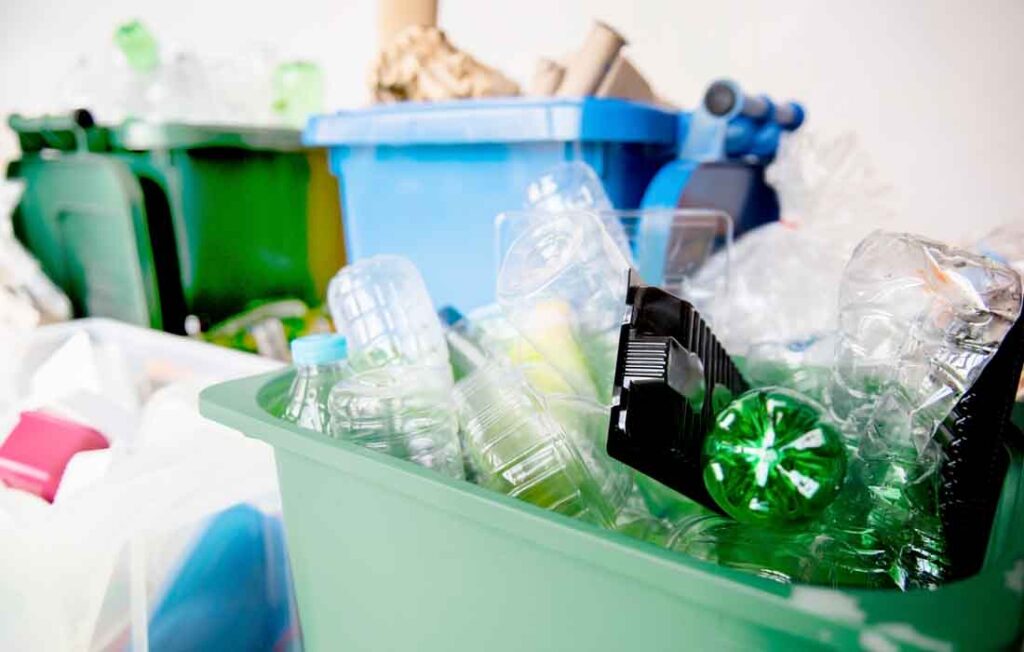Plastics are pervasive on a global level; found in everything we buy from food packaging to home electronics to clothing. Worldwide, the production of plastic has skyrocketed in the last 50 years. As a result, the planet generates about 400 million tons of plastic waste every year. It’s a number so big, it can be difficult to visualize. Consider this: if you take the average weight of humans (65kg) and add up the weight of every person on the planet (one trillion pounds), that’s nearly equivalent to the amount of plastic waste created. Every. Single. Year.
A huge contributor to this problem is single-use plastic, such as takeout containers, plastic bottles, food packaging, and straws. About half the plastic produced each year is single-use plastic. While some plastics are recyclable, most of the planet’s plastic becomes trash, which leads to about 11 million metric tons of this plastic ending up in global oceans. Microplastics, small plastic pieces less than five millimeters long, have also invaded our food system and pose a threat to the health of marine and aquatic life and soil.
When plastics are not recycled, they persist in the environment for centuries. Common household items like diapers and coffee pods can take more than 500 years to break down naturally. Beyond physical plastic pollution, creating plastic is an energy-intensive process that produces planet-warming greenhouse gas emissions. Without any reductions, the production of plastic could generate 1.34 gigatons of greenhouse gas emissions a year by 2030. That’s equivalent to more than 10,000 aircraft carriers (fully loaded).
Don't Panic... ACT!
#1. Support Plastic Fees and Bans
Everyday items like plastic bags, water bottles, takeout containers, and even the tiny microbeads found in personal hygiene products have a negative environmental impact. Policy is the most effective tool to fight plastic pollution. Tell your local, state, and federal politicians that you want to reduce plastic waste. For inspiration, check out the efforts of states across the country that have enacted plastic bans.
#2. Put Pressure on Manufacturers
When you shop, pay attention to packaging. If you believe a brand you support could do better at reducing plastic use, make your voice heard on social media, with a letter, or by patronizing a more sustainable competitor. To start, explore initiatives like Oceana’s campaign to end single-use plastics and the Ocean Conservancy’s effort to create Trash Free Seas.
#3. Volunteer to Clean Up a Waterway
Cleaning up a local waterway is a hands-on way to help reduce the impact of plastic pollution while caring for the environment around you. To lend a hand, check out options like the Ocean Conservancy’s Coastal Cleanups or the Surfrider Foundation’s Better Beach Alliance.
#4. Reduce Before Recycling
While it’s better than the landfill, recycling plastic still has its problems. For starters, some common plastics, like the low-density polyethylene (LDPE) used in shopping bags, are difficult to recycle. Even plastics that are easier to recycle, like the polyethylene terephthalate (PET) found in water bottles, break down during the recycling process. Ultimately, these plastics can only be recycled a limited number of times before they become too degraded to repurpose for other products. From a climate perspective, producing plastics also comes with a big carbon footprint, so cutting our reliance on plastic also reduces global greenhouse gas emissions.
#5. Keep Plastic Out of the Kitchen
Common plastic products used in the kitchen–plastic cups, plates, etc.–can contain harmful chemicals, such as bisphenol A (BPA) and phthalates, which have been linked to a number of negative health effects, including cancer. These chemicals can leach into food, especially when plastic is heated. Instead of using plastic when cooking, use dishes and pans made of glass, porcelain, wood, cast iron, or stainless steel, and avoid heating plastic containers.
#6. Shop for Second-Hand Goods
Purchasing clothes, cookware, toys, and other household items secondhand can help cut plastic pollution since these previously-used products typically come without packaging. Check out local thrift stores and neighborhood yard sales. You can also sign up for local ‘buy nothing’ groups to repurpose and reuse.
#7. Cook at Home More
Eating at home cuts plastic waste generated by single-use takeout containers, plastic cutlery, and plastic bags. At home, it’s easy to store leftovers without relying on plastic products. You’ll cut down on your food waste too!
#8. BYO (Bring Your Own) Everything
From utensils and mugs to bags and diapers, kick the single-use plastic habit by purchasing longer-lasting products meant to be reused. The trick is remembering to bring them with you and actually using them—reusable shopping bags in the trunk of your car, anyone? For more hacks about how to remember your reusables, check out these awesome tips from the town of Stratford in Canada.
#9. Forgo Plastic Straws
Plastic straws are among the most common plastic products found in the planet’s oceans, and they can be fatal to marine creatures, such as birds and sea turtles, when accidently consumed. When eating out, opt for drinks without straws or bring a reusable straw along instead.
Making Positive Changes
It’s time to change the culture surrounding plastic use. And the best place to start? Changing your own habits. It may seem like a lot of work for little visible payoff, but even the smallest actions add up significantly over time!
At a coffee shop? Ask the barista for a ceramic cup. Decline excess packaging at stores or takeout spots such as unnecessary plastic bags, and share news about successful campaigns that fight plastic pollution with as many people as you can. Spread the word on socials, introduce these solutions to your family, and call your local and state representatives to demand change at a larger scale. Make your voice heard.
Together, we can change the culture of waste and plastic use in America.




